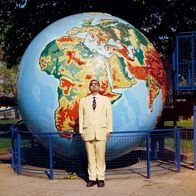Paul Albert Leitner
dal 8/7/2007 al 27/8/2007
Segnalato da
8/7/2007
Paul Albert Leitner
Kunsthalle Wien, Wien
Portraits of Artists and Other People, Self-portraits and Nature. The artist keeps a travel journal in the medium of photography, recording the transformations he undergoes in the course of his voyage through life. Curated by Sabine Folie.

Portraits of Artists and Other People, Self-portraits and Nature
Curated by Sabine Folie
The “picture” comes into being beforehand, in my imagination, and takes shape within its setting before the shot is
actually staged. “Setting” means not necessarily the specific location where I meet the person, but rather the broader
ambience of that location. Sometimes there are clichéd backgrounds like a terrace with a view or a twilight mood.
Paul Albert Leitner
Paul Albert Leitner keeps a travel journal in the medium of photography, recording the transformations he undergoes
in the course of his voyage through life. Entirely in the tradition of Lawrence Sterne’s Sentimental Journey through
France and Italy (1768) and the many subsequent novels of personal development through travel, the artist sets off
(as a young man) on a journey into his own self. His perception passes through the autobiographical form of his
outer, physical existence, juxtaposed in diptych form with nature as a mirror of the soul.
Since the advent of ethnographic study, journeys of this kind no longer exist, as Claude Levi-Strauss grumbles in
Tristes Tropiques (1955): “Journeys, those magic caskets full of dreamlike promises, will never again yield up their
treasures untarnished. A proliferating and overexcited civilization has broken the silence of the seas once and for all.
The perfumes of the tropics and the pristine freshness of human beings have been corrupted by a busyness with
dubious implications, which mortifies our desires and dooms us to acquire only contaminated memories.”
This knowledge of the impossibility of innocence and the nostalgic is combined with poetic-documentary staging of
reality and the construction of fictional figures, based either on himself or on others. There is no place for
sentimentality: the logic of globalism stands in stark contrast to the cracked self, as if the latter were a relic from
bygone times – whether jovial, stiffly suited, or soft and vulnerable in a state of semi-undress: for this is how the
artist’s personae present themselves in his self-portraits.
The artist’s pedantry in his choice of colors, of subject matter, of framing, of the formal and compositional qualities
obscure any emotional involvement. If there is any such involvement at all, then it is twisted into the comical, with the
ironic distance of quotation, be it David’s Death of Marat (1793), Tischbein’s Goethe in the Roman Campagna (1787),
Mantegna’s foreshortened Dead Christ (1480) or a laurel-wreathed Dante in elegiac profile. “Parody,” we are told by
the scholar of the comical, Wilhelm Fraenger, “jokingly keeps the elaborate, noble forms of the mocked original, but
intersperses them here and there with trivial details.“ The echoes of the original are more or less evident, but mostly
knocked off their sublime pedestal into the trivially human or the nostalgically elegiac – as in the many scenes where
the protagonist lies stretched out corpse-like on a bed.
Perhaps only music is truly nostalgic – the music of bygone times which accompanies the artist and his pictures as a
resonator of memory and as the filling of a theatrical space that almost becomes cinematic. It offers comforting
fatigue, and now and then maybe a little ecstasy...
Paul Albert Leitner (born 1957 in Jenbach, Tyrol) has been working for nearly three decades on a photographic
oeuvre including still lifes, landscapes, portraits, and slide-sound collages. At the Kunsthalle Wien project space, he is
showing a series of 240 slides, projected in three rooms: Portraits of Artists, Other People, and Self-portraits and
Nature.
Catalogue: In occasion of the exhibition a catalogue will be published in German/English, containing interviews
conducted by Gerald Matt with Paul Albert Leitner and an essay by Sabine Folie.
Information and image material: Katharina Murschetz, KUNSTHALLE wien, Office: Museumsplatz 1, A-1070 Vienna
Tel.: +43 1 521 891221, Fax: +43 1 521 891217, e-Mail: presse@kunsthallewien.at
Opening: Monday, July 9, 2007, 7 pm
KUNSTHALLE wien
Museumsplatz 1, A-1070 Vienna
Tuesday through Saturday: 4 pm–midnight, Sunday and Monday: 1 pm – 7 pm



